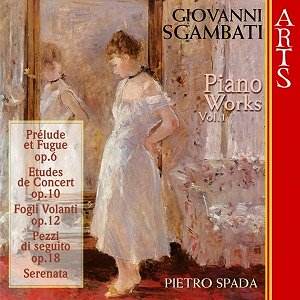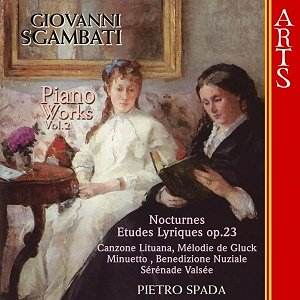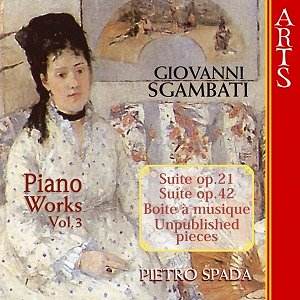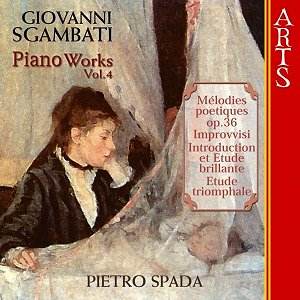|

BUY NOW
Crotchet
AmazonUK
AmazonUS

BUY NOW
Crotchet
AmazonUK
AmazonUS

BUY NOW
AmazonUK
AmazonUS

BUY NOW
AmazonUK
AmazonUS Budget
price
|
Giovanni
SGAMBATI (1841-1914)
The Complete Piano Works played by Pietro Spada
in four volumes
Volume 1
Prélude et Fugue op.6 [5.23 +
9.07]
Deux Etudes de Concert op. 10 [4.05 +
8.25]
Fogli Volanti op. 12: Romanza in A flat
major [4.36]; Canzonetta, in C minor [3.36];
Idillio, in E flat major [1.42]; Marcia (Humoresque),
in A flat major [1.31]; Idillio, in E flat major;
[1.44]; Vecchio Castello, in F minor [3.41];
Epanouissement, in D flat major [1.15]; Combattimento,
in A flat minor [1.38] Campane a festa, in D
flat minor [2.34]
Pezzi di seguito op. 18: Preludio, in
A flat minor [3.47]; Vecchio Minuetto, in D
flat major [5.34]; Nenia, in E flat minor [6.17];
Toccata, in A flat major [5.06]
Serenata from: Sinfonia op.16 in D major
[6.45]
Pietro Spada (piano)
Rec. Rome, Italy, May 1998. DDD
ARTS RED LINE 47587-2 [78´45]
Volume 2
6 Notturni: 1 in B major op. 20/1 [5.50];
2 in G major op. 20/2 [3.50]; 3 in C minor op.
20/3 [7.15]; 4 in B major [5.35]; 5 in D flat
major op. 31 [6.00]; 6 in E major op. 33 [5.01]
Pièces Lyriques op. 23: Rapelle-toi
(Romance), in E major [5.04]; À la fontaine,
in D flat major [2.31]; Vox populi, in F major
[4.29]; Do-Do, in F major [2.11]; Ländler,
in E major [2.48]; Gigue, in E major [5.14];
Benedizione Nuziale, in A flat major [4.04];
Canzone Lituana in F major [4.04]; Mélodie
de Gluck in D minor [3.59]; Minuetto von Beethoven
in G flat major [5.42]; Sérénade
Valsée, in A flat major [3.26]
Pietro Spada (piano)
Rec. Rome, Italy, May 1998. DDD
ARTS RED LINE 47588-2 [79´20]
Volume 3
Suite in B minor op.21: Prélude
[4.35]; Valse [6.00]; Air [3.23]; Air [3.23];
Etude mélodique, in B major [5.00];
Boîte à musique, in D flat
major [5.54];
Romanza, in A major [4.00]
Gavotta, in A flat minor [5.00]
Suite op. 42: Preludio [1.05]; Berceuse
rêverie [4.54]; Melodia campestre [3.53]
Unpublished piecesSerenatina [1.45]
Scherzo, in E major [4.49]
Presentimento, in A flat major [1.31]
Mestizia [4.40]
Romanza [2.33]
Preludio, in C major [1.50]
Pietro Spada (piano)
Rec. Rome, Italy, June 1998. DDD
ARTS RED LINE 47589-2 [67´45]
Volume 4
Mélodies poétiques op.
36: Praeludium, in F major [1.00]; Canzonetta
d'Aprile, in F major [3.10]; Rivelazione, in
B flat major [1.52]; Sull'altalena, in G flat
major [2.02]; Preghiera turbata [1.28]; Ansietà
[1.28]; En valsant [1.16]; Dolci confidenze
[1.30]; En valsant [1.18]; Marche [1.40]; Anima
apassionata [2.06]; Profonda pena [2.29]; Cantico
di speranza [2.43]
5 Improvvisi (Unpublished): (1), in A
major [3.22]; (2), in F sharp minor [6.45];
(3), in E flat major [5.20]; (4), in B flat
major [5.00]; (5), in E flat major [5.52]
Introduction et Etude brillante, in F
major [6.13]
Etude triomphale, in A major [3.17]
 Pietro Spada (piano)
Pietro Spada (piano)
Rec. Rome, Italy, July 1998. DDD
 ARTS RED LINE 47590-2 [65´25]
ARTS RED LINE 47590-2 [65´25]
|

